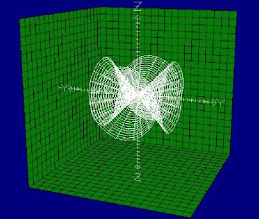I took profit of last week and weekend to acquaint myself with the other essays handling the question "
What's ultimately possible in physics". I read a dozen of them extensively as well as all abstracts and began to organize my evaluations. I voted for two of them but will leave a definite rate for the others after having checked consistency with respect to a broader set of essays. The fact that strikes me, is how low community voters (mainly authors) score each other. The scale runs from 1 to 10, but presently the highest rating is 4.4. That's detrimental for a healthy rating system because we loose in gradation subtleties.
As for the statistics: 114 essays were submitted by 1 woman and 113 man. There is much to do in order to establish gender parity in physics! From the information I gathered, the great majority have US citizenship (43 authors), Germany (10) and India (9) are also strongly represented, as well as Canada (5), Romania (5), Italy (5) and the Netherlands (5, including mine). Russia and UK have each 4 submissions. The rest comes from Australia (2), New Zealand (2), Spain (2), Croatia (2), Slovenia (2), Austria (1), Belgium (1), Brasil (1), Chili (1), Greece (1), Iraq (1), Korea (1), Moldova (1), Mexico (1), South Africa (1), Sweden (1), Serbia (1) and 2 which I couldn't deduce from the information they gave. These numbers should be taken with a grain of salt because I assumed US citizenship for US residents if not mentioned otherwise. There are no submissions from my country of residence. What am I doing here in Paris if there is nobody to discuss foundational questions with ;-) !
Some authors gave me agreement for quoting them, so here are some interesting quotes:
From “
Ultimately anything is possible” by Hrvoje Nikolic, the shortest essay (if you have little time, read it).
“we can never be sure that the laws of physics we know are the final ones, so we always must admit that anything is ultimately possible”.
From “
Mechanics of a Self-Creating Universe” by Anton W. M. Biermans, a “cursory overview of the first insights to come out of an investigation into the question whether a universe can create itself out of nothing”.
“If an electron cannot express its charge if there is no other charge in the universe, then it couldn't be charged itself.”
From “
ant among giants. . .a fable” by Richard P. Dolan, an enjoyable and entertaining essay, with the message that physicists should listen to people outside of their tribe.
“The ant found its chilly reception perfectly proper and understandable, but always experienced a feeling of frustration when some giant publicly expressed ignorance on a question to which the ant thought it had the answer.”
“the physicists were ensnared in a dense thicket of mathematics, desperately trying to get out by going deeper into the thicket. Only the string theorists thought they had hacked their way out of the thicket, but what they found was a vast landscape of universes that had no predictive power and couldn’t be tested—the end of science.”
From “
Ignoramus et Ignorabimus” by Alfred Tang, making the point that physics and theology could benefit one from the other.
“Very often scientific discoveries are made when physics interacts with other disciplines (such as biology). In cross-discipline research, physicists are forced to think outside of the box.”
“precision is only possible if and only if we know exactly what we want to say in closed form. As we approach the limit of physics, we often do not even know what to think. Therefore the exactness of the mathematical language may easily lead to highly specialized rabbit trails down into theoretical blind alleys. When we do not know what we are talking about, it is helpful to take a step back to look at the forest instead of the leaves by thinking in more general terms with common language to develop the proper attitudes. Loquaciousness is perhaps the proper technique for developing attitudes. Proper attitudes constrain the theory space so that theoreticians do not waste time populating the theoretical landscape as in the case of superstring theory.”
From “
To be or not to be strictly deterministic?” by Stefan Weckbach, stating that physical laws and consciousness belong to different realms.
“truths can evolve out of beliefs”
“there is no direct path from our abstract knowledge to ultimate reality”
From “
On the Impossibility of Time Travel” by JCN Smith, demonstrating that a particular time is defined by the configuration of the universe.
“the changes we observe (as well as those we donʼt observe) are the flow of time. If the configuration of the universe did not change, there would be no flow of time.”
From “
Quantum mechanics from a stochastic least action principle” by Joakim Munkhammar, giving a unified vision of classical and quantum least action principle.
“the ultimate possibilities in physics could more clearly be visualized with a better foundation for quantum mechanics.”
From “
At the Frontier of Knowledge” by Sabine Hossenfelder, giving good reasons to say that it is impossible to say what's ultimately possible.
“Physicists have a love-hate relationship with no-go theorems”
“Despite long efforts, no progress has been made. This situation is one that seems to bother physicists today more than ever due to the lack of breakthroughs in fundamental physics that has lasted several decades now. This is even more frustrating since meanwhile the world around us seems to change in a faster pace every day.”
“proofs are only about the mathematical properties of certain objects in their assumptions. A physical theory that describes the real world necessarily also needs a connection between these mathematical objects and the corresponding objects of the real world.”
“What we can thus state with certainty at any time is merely “To our best current knowledge...””


